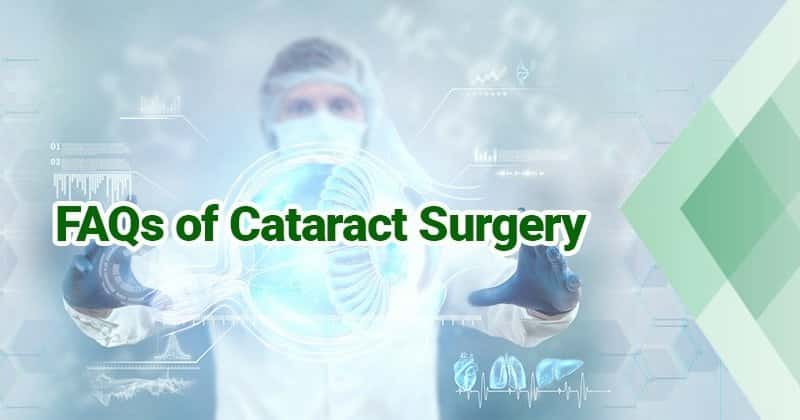Some common FAQs about Cataract Surgery

Some common FAQs about Cataract Surgery
A common cause of vision problems after our 50s is Cataract. Cataract as explained is clouding up of the lens inside our eye that causes vision damage. Something uncorrectable by power glasses or lenses. They can be corrected by Laser Cataract Surgery. In this blog, we will answer some frequently asked questions related to Cataract Surgery.
What is Cataract Surgery?
Cataract surgery or Laser Cataract surgery is the process of removing the lens of your eye and replacing it with an artificial lens.
Eligibility for Cataract Surgery?
A doctor may suggest Cataract Surgery when it starts interfering with the treatment of other eye problems or the vision gets blurry to an extent where seeing becomes practically impossible. Whereas in other cases a waiting period before the cataract surgery won’t have any problems until it doesn’t affect your vision.
Preparation required
There aren’t any strict pre-surgery precautions, but you may be instructed to have twelve-hour fasting before Laser Cataract surgery. You would be advised to stop any medication that could increase the risk of bleeding during the procedure. However, you should inform the doctor if you are on any prostate medicine, as they affect Cataract Surgery. Usage of antibiotic eye drops might be advised before the surgery.
Signs or symptoms for surgery
The cloudiness in the vision may impact only a small part of the eye’s lens and it is possible you won’t be aware of it either. As it grows, the cloudiness increases leading to more noticeable symptoms. Some common signs though are:
- Clouded vision
- Difficulty seeing at night
- Eye sensitivity to light
- Better light requirement for reading & writing
- Appearing halo’s in line of vision
- Frequent changes in eyeglass prescription
- Yellowing of eyes
Types of Cataracts
Cataract types include:
- Nuclear Cataracts: This type of cataract affects the centre of the lens. At first, the eyesight improves in this form of cataracts but later the lens turns yellow then brown resulting in difficulty of vision.
- Cortical Cataract: This type of cataract affects the edge of the lens. Starts with white streaks on the outer edge of the cortex, slowly progressing to the centre interfering with the light passing through it.
- Posterior subcapsular cataracts: Affects the back of lens forming glare or halos in the light of vision. This type of cataract grows faster than the rest.
- Congenital cataracts: Cataract you are born with. It can be due to genetics, trauma, or intrauterine infection. They generally don’t tend to impact vision.
- Length of the procedure: The total time involved door to door is a maximum of two and a half hours. Wherein the Laser Cataract Surgery is of less than twenty minutes.
- Does it hurt?
Commonly, no, Cataract Surgery doesn’t hurt. In addition to the premedication, the anaesthetist numbs the eye to reduce the sensation. - For how long can it be neglected?
Cataract Surgery should not be postponed as the vision distorts completely at later stage or only if the ophthalmologist suggests so. - Post-surgery care
Normally you get discharged the same day. But with certain restrictions like, you won’t be advised to drive, or be able to do small things.
Eyes are a gateway to the universe and proper care is required. Visit Sharp Sight Eye Hospital in Delhi if you are looking for a Cataract Surgery Hospital in Delhi. We perform safe cataract surgery through both conventional and advanced laser techniques.
Recent Posts
-
Beware of 7 Symptoms of Retinal Disorders
January 7, 2026 -
High Blood Pressure can affect your eye health. And how?
December 3, 2025 -
Vision Care after 50
November 7, 2025
